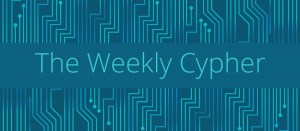The Weekly Cypher is specially curated to keep you up-to-date on the latest in cybersecurity, biometrics, and related news and innovations. Here are a few of the headlines you might have missed this week.
Cyberattacks up prior to midterms, 81.5 million voter records threatened | SC Magazine
Threat actors are ratcheting up their cyberattacks ahead of the 2018 midterms, exposing voter databases, operating influence campaigns and eroding voter confidence, according to research by Carbon Black. Ahead of the 2018 midterm elections, the security firm’s researchers found 20 different state voter databases containing more than 81.5 million voter records – including names, genders, voter IDs, addresses, citizenship status and phone numbers – for sale on the dark web, several of them from swing states, Carbon Black’s quarterly incident response threat report revealed.
New York school district switches on controversial $4m facial recognition technology to identify shooters | DailyMail
An Upstate New York school is using facial recognition technology to help it spot possible school shooters or escaped felons on campus. Lockport City School District has installed a surveillance system in a high school, middle school, and several elementary schools that scans students’ faces to check for matches in its security database. The controversial move has attracted pushback from local parents, privacy advocates, and some legislators who say it could invade students’ privacy.
FIFA, Hacked Again, Braces for New Revelations | The New York Times
FIFA acknowledged this week that its computer systems were hacked earlier this year for the second time, and officials from European soccer’s governing body fear they also might have suffered a data breach. The hack on FIFA, world soccer’s governing body, occurred in March and is not thought to be connected to a cyberattack orchestrated by a group linked to Russia’s intelligence agency in 2017. That incident led to the publication of a list of failed drug tests by soccer players.
New privacy rules will force Canadian companies to disclose data breaches | CBC
New privacy rules designed to better safeguard the personal data of Canadians and let them know when it has been breached kick in Thursday, but even security experts say they are far from perfect. The legislation, known as the Personal Information Protection and Electronic Documents Act (or PIPEDA) does a lot of things, but most importantly from a consumer’s perspective, it requires Canadian companies to alert their customers any time their personal information may have fallen into the wrong hands.
Tomorrowland breach hits 64,000 electronic fans | The Daily Swig
A data breach at a major European music festival saw the personal details of 64,000 revellers compromised, after unusual activity was detected on an older ticketing system. Tomorrowland, one of the world’s largest events for electronic music held in Belgium, said that attendees of its 2014 edition may have had their information stolen in a recent breach that has been reported to the appropriate authorities. “The managers of the Paylogic ticketing system noticed some unusual activity on an older system,” Debby Wilmsen, a Tomorrowland spokesperson, told the Flemish daily, De Standaard.





